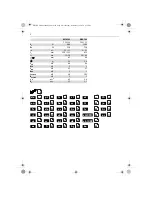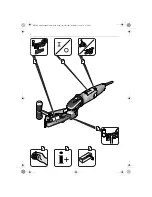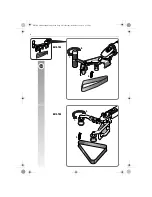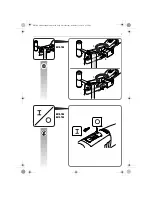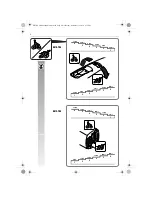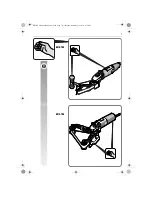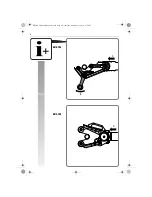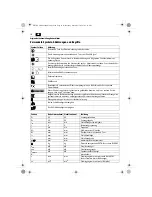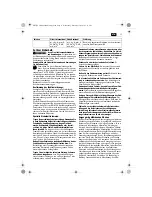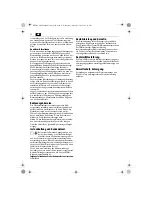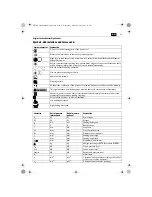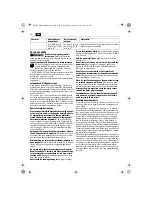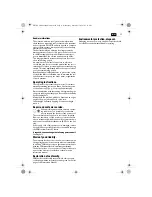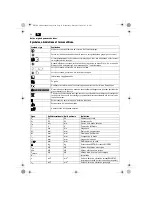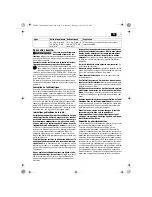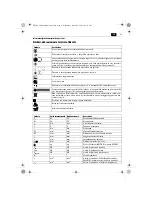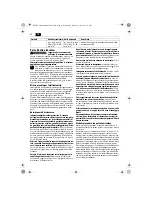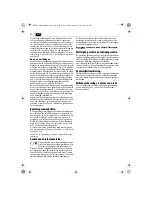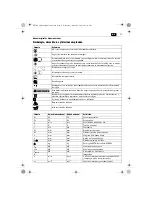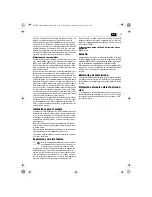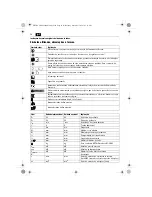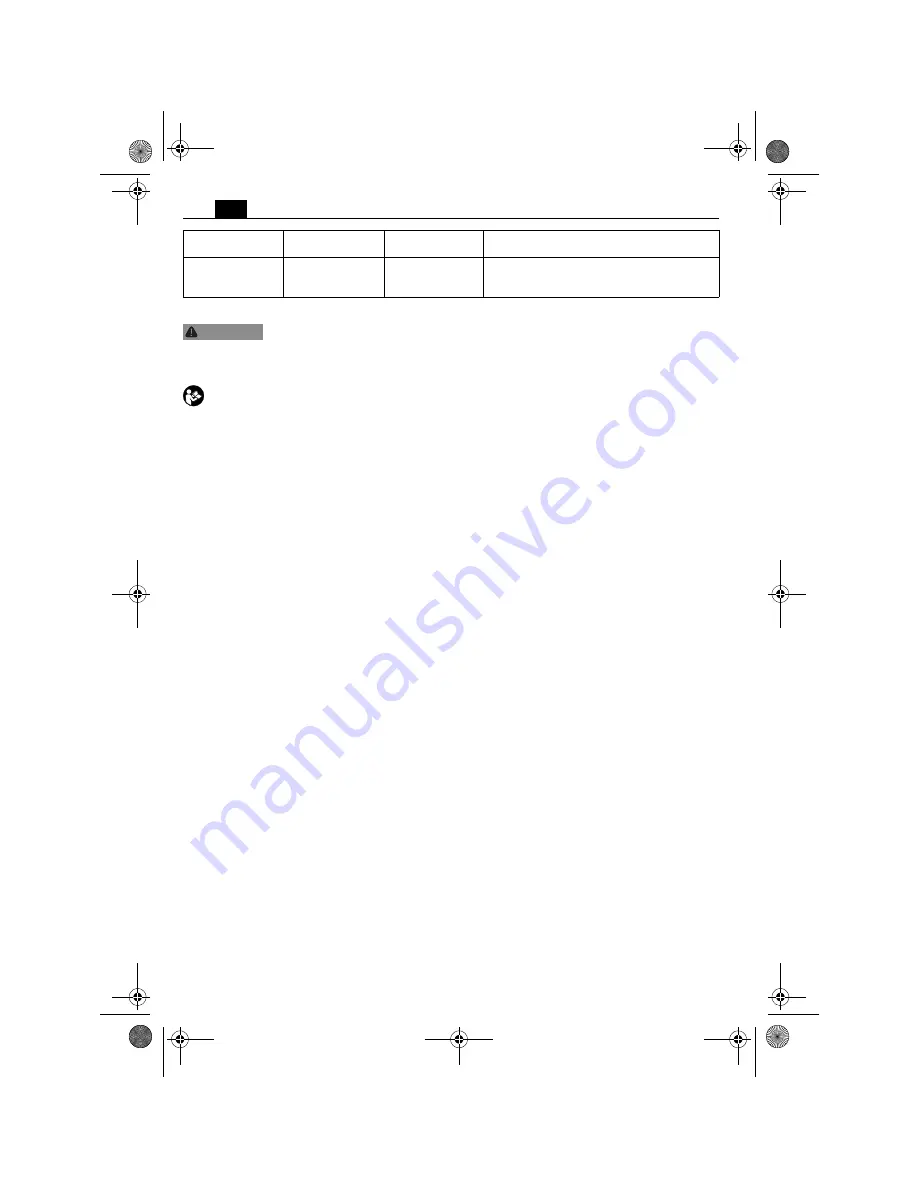
14
en
For your safety.
Read all safety warnings and all
instructions.
Failure to follow the
warnings and instructions may result in electric shock,
fire and/or serious injury.
Save all warnings and instructions for future reference.
Do not use this power tool before you have thor-
oughly read and completely understood this
Instruction Manual and the enclosed “General
Safety Instructions” (document number
3 41 30 054 06 1). The documents mentioned should be
kept for later use and enclosed with the power tool,
should it be passed on or sold.
Please also observe the relevant national industrial safety
regulations.
Intended use of the power tool:
Hand-guided sander for dry belt sanding of surfaces of
metal, plastic, wood, composite materials, paint/varnish,
filler and similar materials in weather-protected environ-
ments with the application tools and accessories recom-
mended by FEIN.
This power tool is also suitable for use with AC genera-
tors with sufficient power output that correspond to the
Standard ISO 8528, design type G2. This Standard is par-
ticularly not complied with when the so-called distortion
factor exceeds 10 %. When in doubt, please refer to the
generator instruction/specification guide.
Special safety instructions.
Wear personal protective equipment. Depending on appli-
cation, use face shield, safety goggles or safety glasses.
As appropriate, wear dust mask, hearing protectors,
gloves and workshop apron capable of stopping small
abrasive or workpiece fragments.
The eye protection
must be capable of stopping flying debris generated by
various operations. The dust mask or respirator must be
capable of filtrating particles generated by your opera-
tion. Prolonged exposure to high intensity noise may
cause hearing loss.
Hold power tool by insulated gripping surfaces, because
the belt may contact its own cord.
Cutting a “live” wire
may make exposed metal parts of the power tool “live”
and could give the operator an electric shock.
While working, do not wear loose clothing, jewellery or
open, long hair.
Despite protective devices, loose objects
can be snagged or caught by moving parts and lead to
injury.
Do not use worn, torn or heavily clogged sanding belts.
Handle sanding belts carefully and store them according
to the manufacturer’s instructions. Do not bend or fold
sanding belts!
Damaged sanding belts can tear, be flung
away and injure someone.
Never touch the running sanding belt.
Danger of injury.
Secure the workpiece firmly.
A work piece that is gripped
tightly in a clamping device or vice, is more secure than if
held by hand.
Hold the power tool firmly.
High reaction torque can
briefly occur.
Do not rivet or screw any name-plates or signs onto the
power tool.
If the insulation is damaged, protection
against an electric shock will be ineffective. Adhesive
labels are recommended.
Do not use accessories which are not specifically
designed and recommended by the power tool manufac-
turer.
Safe operation is not ensured merely because an
accessory fits your power tool.
Clean the ventilation openings on the power tool at regu-
lar intervals using non-metal tools.
The blower of the
motor draws dust into the housing. An excessive accu-
mulation of metallic dust can cause an electrical hazard.
Before putting into operation, check the mains connec-
tion and the mains plug for damage.
Recommendation: The tool should always be supplied
with power via a residual current device (RCD) with a
rated current of 30 mA or less.
Handling hazardous dusts
For work procedures with this power tool where mate-
rial is removed, dusts develop that can be hazardous to
one’s health.
Contact with or inhaling some dust types, e. g. asbestos
and asbestos-containing materials, lead-containing coat-
ings, metal, some wood types, minerals, silicate particles
from materials containing stone, paint solvents, wood
preservatives, antifouling paints for vessels, can trigger
allergic reactions to the operator or bystanders and/or
lead to respiratory infections, cancer, birth defects or
other reproductive harm. The risk from inhaling dusts
depends on the exposition. Use dust extraction matched
appropriately for the developing dust, as well as personal
protective equipment and provide for good ventilation of
the workplace. Leave the processing of asbestos-contain-
ing materials to specialists.
Wood and light-metal dust, hot mixtures of sanding dust
and chemical materials can self-ignite under unfavourable
conditions or cause an explosion. Avoid sparking in the
direction of the dust collector as well as overheating of
the power tool and the materials being sanded, empty the
dust collector/container in time, observe the material
manufacturer’s working instructions, as well as the rele-
vant regulations in your country for the materials being
worked.
m, s, kg, A, mm, V,
W, Hz, N, °C, dB,
min, m/s
2
m, s, kg, A, mm, V,
W, Hz, N, °C, dB,
min, m/s
2
Basic and derived units of measure from the inter-
national system of units
SI
.
Character
Unit of measure,
international
Unit of measure,
national
Explanation
WARNING
OBJ_BUCH-0000000019-001.book Page 14 Wednesday, November 10, 2010 3:35 PM
Summary of Contents for RS 12-70E
Page 3: ...3 5 6 4 9 8 7 5 OBJ_BUCH 0000000019 001 book Page 3 Wednesday November 10 2010 3 35 PM ...
Page 7: ...7 RS10 70E RS12 70E OBJ_BUCH 0000000019 001 book Page 7 Wednesday November 10 2010 3 35 PM ...
Page 9: ...9 RS10 70E RS12 70E OBJ_BUCH 0000000019 001 book Page 9 Wednesday November 10 2010 3 35 PM ...


